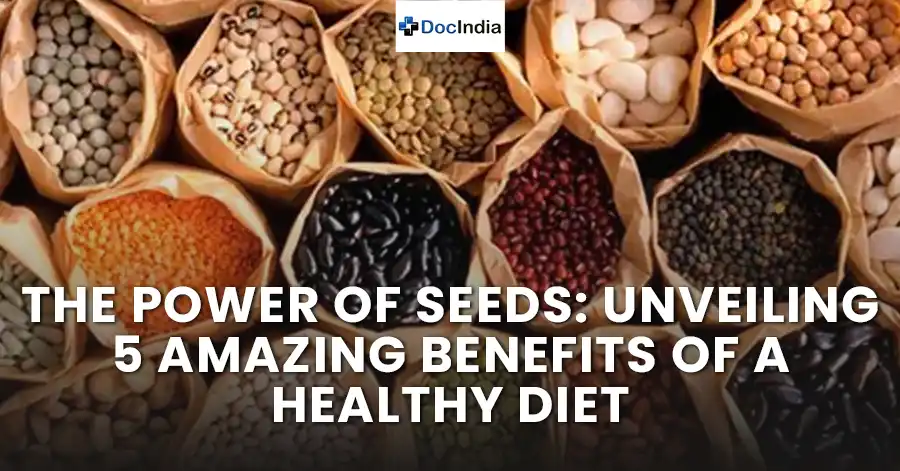The Power of Seeds: Unveiling 5 Amazing Benefits of a Healthy Diet

Healthy Diet: Explore 5 Amazing Benefits Of These Seeds
In the quest for a healthier lifestyle, individuals often overlook the significance of incorporating seeds into their daily diet. Seeds, tiny powerhouses of nutrition, are packed with essential nutrients that contribute to overall well-being. From chia and flaxseeds to sunflower and pumpkin seeds, each type offers unique health benefits. In this study, we will explore five amazing advantages of including seeds in your diet, shedding light on their nutritional prowess and the positive impact they can have on your health.
1. Rich in Nutrients: The Foundation of a Nutrient-Dense Diet
Seeds are nutritional gems, containing a plethora of essential vitamins, minerals, and antioxidants. Incorporating a variety of seeds into your diet ensures a diverse range of nutrients that support various bodily functions. For instance, flaxseeds are renowned for their high omega-3 fatty acid content, crucial for heart health and cognitive function. Chia seeds, on the other hand, provide an excellent source of fiber, promoting digestive health and aiding in weight management.
Sunflower seeds boast an abundance of vitamin E, a powerful antioxidant that protects cells from oxidative damage. Pumpkin seeds are a rich source of magnesium, which plays a vital role in muscle and nerve function, blood sugar regulation, and bone health. Sesame seeds contribute to bone health with their calcium content, and hemp seeds offer a complete protein profile, making them an excellent choice for vegetarians and vegans.
2. Heart Health: Nurturing Cardiovascular Wellness
A heart-healthy diet is crucial for maintaining cardiovascular well-being, and seeds play a significant role in achieving this goal. Several types of seeds, including chia, flaxseeds, and pumpkin seeds, are loaded with omega-3 fatty acids. These essential fats help lower blood cholesterol levels, reduce inflammation, and decrease the risk of heart disease.
Moreover, sunflower seeds contain phytosterols, plant compounds that have been associated with lowering cholesterol levels. Pumpkin seeds are rich in magnesium, which has been linked to improved blood pressure regulation. By incorporating a variety of seeds into your diet, you can actively contribute to the health of your heart and reduce the risk of cardiovascular diseases.
3. Weight Management: The Role of Seeds in a Balanced Diet
Achieving and maintaining a healthy weight is a common goal for many individuals, and seeds can be valuable allies in this journey. Seeds are high in fiber, which promotes a feeling of fullness and satiety, preventing overeating and snacking between meals. Chia seeds, in particular, form a gel-like consistency when mixed with liquid, expanding in the stomach and aiding in appetite control.
Additionally, the healthy fats found in seeds, such as omega-3 fatty acids, contribute to a balanced diet that supports weight management. The protein content in seeds, especially in varieties like hemp and chia seeds, helps in building and repairing tissues, supporting muscle health during weight loss.
4. Gut Health: Nourishing the Microbiome for Overall Wellness
The health of the gut microbiome is increasingly recognized as a key factor in overall well-being, and seeds can play a vital role in supporting a healthy digestive system. The fiber content in seeds promotes regular bowel movements and prevents constipation. Chia seeds, with their unique ability to absorb water and form a gel, act as a prebiotic, supporting the growth of beneficial gut bacteria.
Furthermore, seeds contain compounds that have anti-inflammatory and antioxidant properties, contributing to a balanced and harmonious gut environment. Pumpkin seeds, for instance, contain zinc, which supports the immune system and aids in the healing of the intestinal lining. By nurturing a healthy gut microbiome, seeds contribute to improved digestion, nutrient absorption, and overall wellness.
5. Brain Health: Nourishing Cognitive Function with Seeds
Cognitive health is a crucial aspect of overall well-being, and certain seeds have been associated with brain-boosting benefits. The omega-3 fatty acids found in flaxseeds and chia seeds play a vital role in brain development and function. These essential fats are integral components of cell membranes in the brain, supporting communication between nerve cells and enhancing cognitive function.
Moreover, seeds contain antioxidants that protect the brain from oxidative stress and inflammation, contributing to a lower risk of neurodegenerative diseases. Pumpkin seeds, rich in magnesium, have been linked to a reduced risk of age-related cognitive decline. Including a variety of seeds in your diet can provide the necessary nutrients to support optimal brain health and cognitive function throughout life.
Incorporating seeds into your daily diet is a simple yet powerful way to enhance your overall health and well-being. From the rich array of nutrients they offer to their specific benefits for heart health, weight management, gut health, and brain function, seeds deserve a prominent place in a balanced and nutritious diet. Whether sprinkled on yogurt, added to smoothies, or incorporated into baked goods, the versatility of seeds makes it easy to enjoy their numerous health benefits.
As we continue to explore the intricate connections between diet and health, seeds stand out as tiny nutritional powerhouses that can make a significant difference in our lives. By embracing the diverse and delicious world of seeds, we take a proactive step towards a healthier and more vibrant future.
